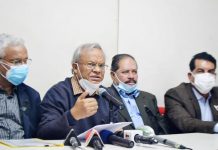Dr. Nizam Uddin Ahmed:
According to the World Health Organization report, 67% of the total deaths in Bangladesh each year are due to non-communicable diseases. Among the main causes of these diseases is the excessive use of tobacco and tobacco products. The total number of deaths due to non-communicable diseases in Bangladesh is 5 lakh 72 thousand; Out of which 1 lakh 62 thousand deaths are directly due to tobacco-related diseases.
Non-communicable diseases are enough to shake the economic base of an entire family, not just physically. Economically, we are rising to a middle-income country, but still, the financial support of the vast majority of people in the country is not enough to treat non-communicable diseases. Therefore, tobacco control is essential to prevent these diseases in the protection of public health. Tobacco control requires timely revision of the Tobacco Control Act and its implementation.
Current picture and health threats of tobacco in Bangladesh
According to the ‘Noncommunicable Diseases Risk Factor Survey: Bangladesh 2010’, 98.7% of adults are at risk of at least one noncommunicable disease. Besides, 77.4% of people are at risk of at least two non-communicable diseases. The use of tobacco and tobacco products acts as one of the influencers in these diseases.
Tobacco use accounts for 14% of all deaths from non-communicable diseases worldwide. Currently, about 1.5 million people in Bangladesh are suffering from tobacco-related diseases, of which 61,000 children are sick due to second-hand smoke. 35.3% (3 crores 78 lakh) of adults in the country use tobacco (15 years and above). Tobacco users have a higher risk of developing tobacco-related diseases such as heart disease, stroke, COPD, lung cancer (57%) and other cancers (109%) compared to people who have never used tobacco.
This is a rough statistic. Apart from this, there are also geographical and social issues. In terms of the prevalence of tobacco use, Bangladesh is higher than neighbouring countries. Again, the number of women who are addicted to tobacco is higher in terms of men and women. According to data from the Global Tobacco Atlas, 2017, 25.2% of women in Bangladesh use some form of tobacco; While it is 14.2% in India, 7.6% in Thailand, 5.4% in Pakistan and 2.1% in China.
Along with this is the effect of secondhand smoke. Geographically, more than 50% of women in this country suffer from Anemia. On top of that, addiction to tobacco products is increasing new problems like uterine cancer, and reduced fertility. In addition, tobacco also has an impact on the incidence of low birth weight, mental and physical disabilities or stunted births in different parts of the country.
Moreover, the prevalence of smoking at an early age is increasing among urban children, along with the prevalence of second-hand smoke. In a survey titled ‘Bangladesh primary school children exposed to second-hand smoke’ published by Oxford University in the UK, 95% of Dhaka’s children are exposed to second-hand smoke in one way or another. More than 61,000 children (under 15 years of age) suffer from diseases caused by secondhand smoke every year.
Government initiatives on tobacco control
The Bangladesh government has always been aware of the damage of tobacco to public health.Also, Article 32 of the Constitution protects the right to life. In continuation of this, Bangladesh is the first country to sign the Framework Convention on Tobacco Control (FCTC) of the World Health Organization. Later, after enacting the first tobacco control law in 2003, the current government updated the law by amending it in 2013. Then in 2015, the Tobacco Control Act was passed. However, with the passage of time, various inconsistencies have been found in the law.
In 2016, the honourable Prime Minister announced that the country would be tobacco-free by 2040. From the beginning, various non-governmental organizations have been conducting regular activities against tobacco, but after the Prime Minister’s announcement, the government organizations also became restless. The National Tobacco Control Cell (NTCC) was created, which is carrying out government work on tobacco control under the supervision of the Ministry of Health and Family Welfare.
Means of passage and importance of tobacco law amendments
Factors responsible for non-communicable diseases include smoking and other tobacco products, unhealthy or uncontrolled eating habits, sugar and trans-fat-rich foods, lack of physical activity, air pollution, high blood pressure, diabetics, respiratory diseases, etc. Some of these are in our hands to control, some are at the policy-making stage. While we can control diet or exercise, we cannot control tobacco individually. Can’t control air pollution. These require policies. But in Bangladesh, not much importance has been given to prevent these diseases through controlling the risk of non-communicable diseases. Most of the allocation for the health sector in our country is spent on medical care. But little attention is paid to the formulation and implementation of appropriate laws and policies, including raising awareness for healthy lifestyles.
The importance of tobacco eradication has emerged from these places. If we succeed, we can be ahead in a few things. On the one hand, as it will be possible to prevent non-communicable diseases, it will also be possible to benefit financially. There is a strong demand for strengthening the existing Tobacco Control Act to free the country from the scourge of tobacco. Although the existing law has been amended, several inconsistencies have arisen in the law over time, due to which a fresh amendment is necessary.
The significant demands are, 1. Ensuring a 100% smoke-free environment by banning smoking in all public places, workplaces and public transport, including the abolition of designated smoking areas; 2. Prohibition of display of tobacco products in places of sale; 3. A total ban on tobacco company social responsibility programs or CSR; 4. stop selling retail cigarettes; 5. Banning the import and sale of increasingly popular products such as E-Cigarettes and Heated Tobacco Products (HTP) and 6. Imposing stricter restrictions on tobacco packaging including increasing the size of pictorial health warnings.
We are saying that the product cannot be displayed at the place of sale of tobacco products. But tobacco products are still being sold in almost every place, including hospital grounds or around schools, to attract attention. Although the existing law prohibits advertising of tobacco products, there is scope for displaying such packets or cartons at the point of sale. It is important to work on this issue. This can reduce the smoking rate by up to 7%. Already 50 countries of the world are implementing this rule. A third demands a complete cessation of corporate social responsibility or CSR activities of tobacco companies.
At present tobacco companies are prohibited from using their name, logo etc. if they conduct CSR. 62 countries have already stopped such CSR activities. The provision of a pictorial warning message on tobacco product packets is effective enough. Existing laws mandate such pictorial warnings to cover 50% of packets. We have also benefited from it. But in neighbouring Sri Lanka, 80% of packets, 85% in India and 90% in Nepal carry pictorial warnings. We also think that it is necessary to increase from 50% to 90% law.
One of the obstacles to tobacco control in Bangladesh is the retail sale of all tobacco products, including retail cigarettes. As the number of new smokers is increasing due to the easy availability of cigarettes, the expenditure on tobacco products is increasing among the poor. At least in the context of Bangladesh, stopping retail tobacco is very important. Already 118 countries around the world have done this, and are reaping the benefits.
The latest demand is to ban e-cigarettes. While we are all working together on tobacco control, the availability of new types of products such as e-cigarettes and heated tobacco products (HTPs) cannot be taken for granted. Young people are mainly attracted to e-cigarettes, which are very harmful to public health. Research by the American Stroke Association reports that e-cigarettes increase the risk of stroke by up to 71%. The risk of coronary and heart disease increases by 59 and 40%, respectively. Its flavouring agents increase the risk of long-term diseases of the respiratory system, liver, and kidneys. In the meantime, realizing its harmful effects, e-cigarettes or vaping have been banned in a total of 33 countries, including neighbouring India.
In addition to these, social responsibility and increasing public awareness is a big task. As a solution, I would like to mention a few points-
• Appropriate policies are needed to prevent non-communicable diseases. From the policy-making stage, the diseases that cause more premature death and disability in the current state of the country should be properly diagnosed, and prevention and modern treatment should be allocated for public health development.
• The Tobacco Control Act should be amended and implemented with a focus on public health protection as soon as possible.
• Smoking rates among young people are increasing. They need to be protected. We have to work on the matter so that new smokers are not created. For this, as the amended law needs to be implemented, the production and import of all types of heated tobacco, including e-cigarettes, should be stopped.
• Multi-sectoral initiatives should be undertaken by all parties, public-private and society through coordination. In addition to the government, local parliamentarians, educational institutions, media, NGOs, CSOs and social media have a role to play.
A healthy lifestyle helps us stay healthy. However, non-communicable diseases can be easily prevented if diagnosed at an early stage. Because it is an expensive treatment. Long-term preventive measures must be taken with family, economy and society together. Therefore, it is important to work to save people’s lives through social movements to improve public health from the beginning with the root causes. If we succeed in that, not only the implementation of tobacco-free Bangladesh will be possible, but common people will also have confidence in health protection.
Author: Dr. Nizam Uddin Ahmed
Public Health Specialist
Executive Director, ShasthoShurokkha Foundation
Vice-Chair, Gavi CSO Steering Committee














